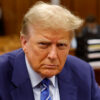The Obama Administration appears to be ignoring Russian violations of arms control agreements in favor of securing future agreements, which will eventually leave the United States vulnerable to Russia’s growing intercontinental ballistic missile (ICBM) capabilities.
In a recent article, Mark Schneider of the National Institute for Public Policy points out that President Obama’s new arms control proposal with Russia, as outlined in his recent Berlin speech, lacks a serious consideration—arms control verification. A new agreement with Russia would be useless without a stronger commitment from the Obama Administration to enforce compliance though previous, long-standing treaties.
According to both former Undersecretary of State John Bolton and former Assistant Secretary of State Paula DeSutter, Russia’s recent testing of the new Rubezh missile is an “apparent violation” of the Intermediate-Range Nuclear Forces (INF) Treaty. Both Bolton and DeSutter contend that all three test launches exceeded the 500 km to 5000 km INF range, with the June 6 test launch reportedly traveling 2,000 km.
The Russians do not appear to be hiding the fact that their ICBM efforts are based on exposing American vulnerability, as Russian Deputy Prime Minister Dmitry Rogozin called the Rubezh a “missile defense killer.… Neither current nor future American missile defense systems will be able to prevent that missile from hitting a target dead on.”
Schneider notes that the Rubezh missile is “at a minimum…a major circumvention of the INF Treaty, as well as a possible violation of the INF Treaty, the New START Treaty or both.” Nevertheless, the Obama Administration seems intent on achieving another nuclear arms agreement with Russia, even though it was revealed that the New START treaty unilaterally cuts the U.S. nuclear arsenal while the Russian arsenal grows. In effect, this leaves the U.S. at a strategic disadvantage, especially if the Russians are not playing by the rules.
Congressman Mike Rogers (R–AL), chairman of the House Armed Services subcommittee on Strategic Forces, concluded that “the president will ignore significant Russian cheating…so that he can propose further reductions with [Russian President] Vladimir Putin.” Schneider describes Rogers’s critique as a “credible explanation of current U.S. policy.”
If the U.S. is pursuing another reduction treaty as an end in itself, it does so at the expense of American strategic posturing and security. The U.S. should enforce treaties that are already in place and not reward Russian noncompliance with new proposals of unilateral reduction.
Joshua Holdenried is currently a member of the Young Leaders Program at The Heritage Foundation. For more information on interning at Heritage, please click here.



























